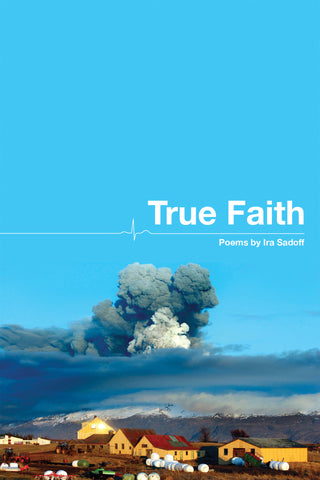
About This Title
Gerald Stern once referred to Ira Sadoff as "one of the supreme poets of his generation," as one who "belongs in every major anthology, every library." In True Faith, Sadoff playfully, ambiguously, ironically, and sometimes with stark emotional directness searches out the ongoing pleasures of living passionately and intensely. True Faith celebrates and sings of the frailty, resilience, and ultimately the preciousness of life itself, reinvigorating Whitman’s urgent question: "If we are not flashes and specks," what are we?
"Adam"
So little time left to ruin: I hardly have a minute
to cover up those old rapid-fire faux pas
that left my head turned around, staring into the wreckage,
the old void in my mother, the extraction the minute I was born.
Some rituals die slowly, so the stupid parts of us stay shamed.
When we make ourselves small and sinister,
what nakedness is worth watching? As for our bosses, God,
the Father, the registrar, former lovers and commanders,
our insufficiencies excite them, so they lock doors to their offices
and do what they do there. I am not concerned with being unloved.
Not concerned about a parking space, the mistake
in my checkbook, sour milk in the Frigidaire, not the state
of my soul after a series of drinking binges.
So what is it that incites me, that shadows me with a rucksack,
with a deep raspy voice? A few childhood songs just before bed,
oh and those lanterns--it's New Year's in Beijing--the slate's
graced with calligraphy, all the elaborate figures
and signs-- I don't know a thing about them. They're assigned
their own gods and devils, they can't see me close up,
they have their own basilicas, they minister
to their loyal citizens their own shrieks and yammers.
PRAISE FOR TRUE FAITH
"Ira Sadoff’s True Faith both yearns for and calls into question the mechanisms for creating transcendence. He writes, 'we all have one breath, it’s the same breath' and our humanness drives us toward a myriad of sins. Each creates for himself a god, be it religious, artistic, economic, or political, which brings miracles of beauty into his life. For this poet, imagination is what allows us to '[walk] away from the accident' and consequently metaphor-making is critiqued in its most natural home. For perhaps it too has been 'wired wrong.' These remarkable poems are ultimately profound and unflinching meditations on how to understand all that is lacking in a life remembered. This insightful and timely collection continues to secure his reputation as one of our preeminent poets." —Claudia Rankine
"[True Faith] culminates in a catharsis and a faith found in something as flawed as ourselves, both out of necessity and a cautious optimism . . . Folks, this book is a stunner." —storySouth

